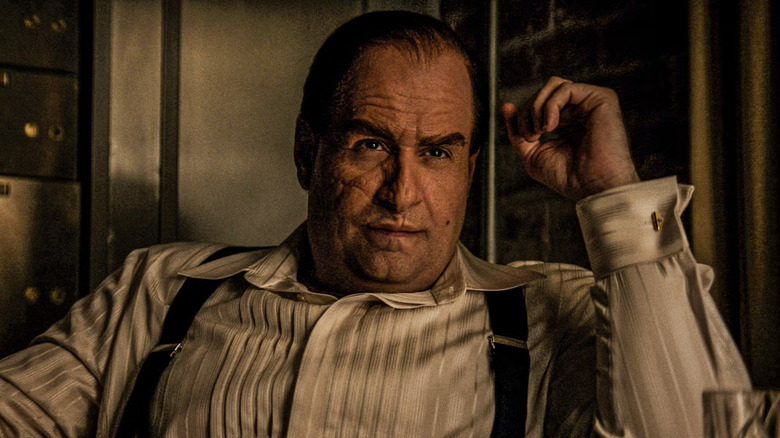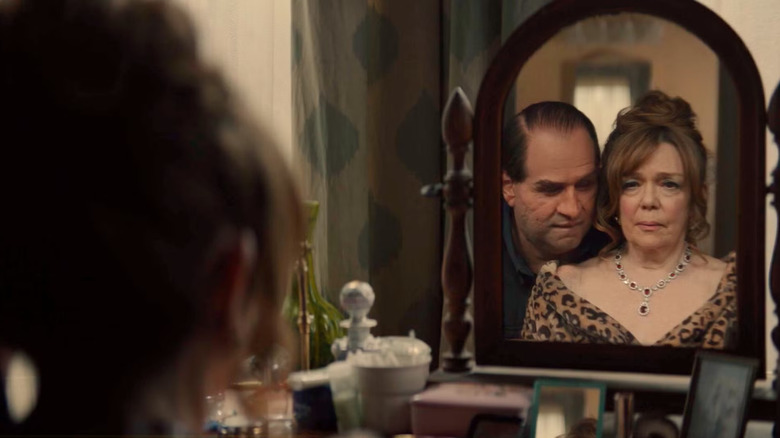The Penguin Spotlights A Medical Issue That Rarely Gets The Attention It Needs
This article contains mild spoilers for episode 6 of "The Penguin."
At their core, art and entertainment are explorations of and discussions about the human condition. This is deeper than media simply being educational or acting as a necessary distraction (though it can certainly function both of those ways, too); art allows for the possibility and expansion of empathy, a deeper understanding of the world and those who live in it. For so many of us, art tells us that we're not alone and that the events, thoughts, and emotions we're going through, whether joyous or tragic, are a shared experience. The concept of "raising awareness" sounds trite and nearly useless on paper, but through well-made art, it can be tremendously effective.
It's for this reason that I was so pleased to see episode 6 of Max's "The Penguin," because it includes a scene that not only helps deepen the characterizations of Oz Cobb (Colin Farrell) and his mother, Francis (Deidre O'Connell), but introduces the topic of a real-life disease that has been something myself and my family have been dealing with for the past several years since my father's own diagnosis. In the scene, Oz tells his sidekick/partner/protege Victor (Rhenzy Feliz) why he's been so personally dedicated to his mother's care. Turns out that she's not just elderly, but that she's currently suffering from the condition known as Lewy Body Dementia. The disease is an offshoot of Parkinson's, to the point where one is often misdiagnosed for the other, and while this is not a new disease, it's not very widely known or talked about.
Thus, its appearance in "The Penguin" is not only a sharp bit of writing, adding more real-life verisimilitude to a series based on the "Batman" comic book universe, but is also something that helps me and others who have people they love suffering from the condition feel seen, heard, and understood. Like any disease, more discussion around it leads to better diagnosis, better treatment, and better understanding.
How 'The Penguin' utilizes Lewy Body Dementia for drama
Diseases and medical issues have been used as dramatic devices since the dawn of drama itself, not just for purposes of relevance or as a way to explain a character's absence, but because of the side effects and repercussions some conditions can have. Some diseases are just more inherently dramatic — not many films or TV shows have exploited the diseases I've suffered through during my own life so far (namely Ulcerative Colitis, which is a sister condition to Crohns, and Primary Sclerosing Cholangitis (also known as PSC), which is a liver condition that led to me getting a transplant) — but you can throw a stone and hit a film or series episode that involves a character with cancer or Alzheimer's.
Lewy Body Dementia's relationship to Alzheimer's allows storytellers to lean into the uncanny valley that both diseases present symptomatically; for the patient, the increasing horror of no longer being able to recognize everything from one's surroundings to how to perform simple tasks, and for the caregiver, the hardship of having to help an adult continually re-learn how to function.
"The Penguin" also makes use of Lewy's ability to cause confusion and even hallucinations in the person living with the disease. As the Mayo Clinic describes, Lewy Body Dementia involves protein deposits called Lewy bodies that develop within the brain's nerve cells, a process that results in impaired thinking, memory, and movement. Given how the disease attacks cognitive functions, it can also cause hallucinations, such as making the person believe that they're currently living in a totally different time in their lives. In Francis' case, she's been privy to some shady dealings during her life in Gotham, either things she's done herself or observations she's made about her son, which could potentially lead to some secrets being inadvertently unearthed that Oz doesn't want coming out.
Additionally, Oz and Francis have a contentious relationship on top of the latter's condition, with Francis continually pushing Oz to be more strong and ruthless, something she can get away with given Oz's fawning devotion to her. In distinction from most diseases, which tend to involve deterioration, Lewy Body Dementia can be a wild card, where the person hasn't lost any of their intelligence, just their ability to process context and conjure up memory. In other words, just because Francis is living with the disease doesn't mean she's not able to be a threat, either to her son's kept secrets or his enemies.
'The Penguin' accurately depicts the confusion involved with the condition
Part of the trade-off involving realism within fiction and storytelling is that the story comes first. While it's appropriate and imperative that the people behind film and television do their research and make attempts to treat real-life issues with accuracy, there will always be a need to fudge the truth for the maximum dramatic effect. In other words, it's ultimately about the spirit of the thing, not the letter.
What "The Penguin" does so impressively is accurately depict the frustration one feels when trying to care for a family member with Lewy's. In episode 6, entitled "Gold Summit" written by Nick Towne and directed by Kevin Bray, Oz vocalizes this frustration to Vic, pointing out that it's not just having to deal with Francis' condition that makes the situation a hardship, but how the doctors misdiagnosed his mother several times, claiming that at first she had Alzheimer's, then Parkinson's, and then Lewy's. This chain of events directly mirrors my own experience with my father's diagnosis, as his condition has been diagnosed and re-diagnosed a couple of times now. It's important to state that, to date, there is no cure or medications that slow or reverse the condition, merely things that can help treat or reduce the symptoms. As such, living with the disease is a continual process, one which tends to not have the finality of knowing exactly which disease it is you're dealing with.
'The Penguin' has a realism that the series is stronger for having
This is why it's heartening to see the mention of Lewy's turn up in "The Penguin," as it provides some measure of comfort and understanding to those of us who've already become aware of the disease. It's a surprisingly sober choice for a series adapted from 2022's "The Batman," which introduced the concept of a fictional recreational drug known as "Drops," a substance that still plays a part in "The Penguin." While fictional elements can be just as powerful as real-life ones, the Drops have remained pretty vague in the film and the series; apparently, they're highly addictive and illegal, providing users with some type of euphoria, but we haven't seen much in the way of how using them feels versus what being addicted to them can result in. The series' introduction of the Bliss drug is much stronger, given that we're shown its origins and effects. Similarly, the confirmation of Lewy's as Francis' condition makes her character, her struggle, and her relationship with Oz far more grounded (as well as more distinct from a similar dynamic between analogous characters in other media, such as in "The Sopranos").
Ultimately, the series bringing up the topic of Lewy's is a net positive, as it throws light onto a condition that still feels like it's too much in the dark, both for people unaware of its existence as well as those dealing with it directly. As O'Connell said in a recent New York Comic Con roundtable interview (via GamesRadar), she too has a personal relationship with the disease, making her work on the show that much more informed:
"I know more about it than I would like to know about it because my dad had it and my mom's got it. I felt a responsibility to talk about that in being Francis. I was lucky enough to find a PT nurse for Parkinson's who let me into their homes to watch them doing their PT sessions. I unfortunately also know a bunch of people with Parkinson's, so I knew the feel of that, I knew the feel of everybody. I just felt a huge responsibility to not ever soft-sell it, but not be showy with it, and give her the dignity of being someone who did not want people to know about it and did not want to be in this situation and was not playing the dependence card at all."
Being someone lucky enough to have seen the rest of "The Penguin," I can attest that O'Connell and the show have made good on her words there and that the depiction of Lewy's through Francis (as well as the caregiving through Oz) is something that both resonates with my experience and feels appropriate for the show itself. Rather than being a distraction or an unwelcome introduction of reality into noir- and comic book-inspired fiction, the usage of the disease helps bring me comfort. After all, since we know such things as the condition can exist in real life, then maybe, just perhaps, there exists the hope and justice that Batman represents, too.
"The Penguin" is now streaming on Max.



